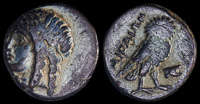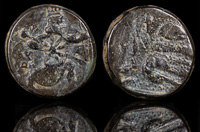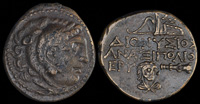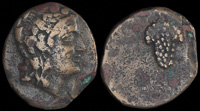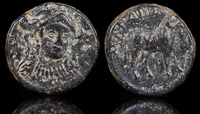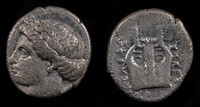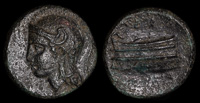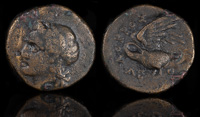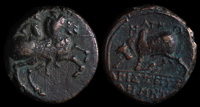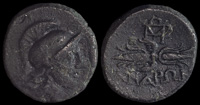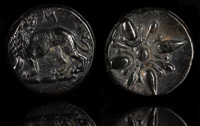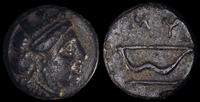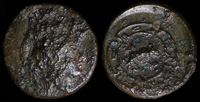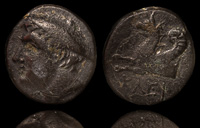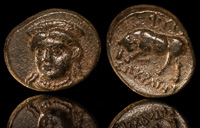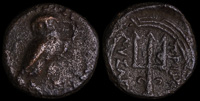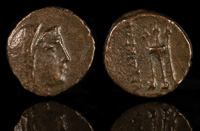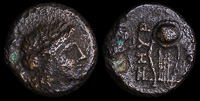Ionia
Miletos begins to be inhabited.
Miletos is inhabited by Minoans.
Miletos is overrun by mainland Greeks.
Mycenaean settlers occupy Miletos.
Transition phase in Miletos. Both phases are Mycenaean.
Approximate date when the Hittite king Mursilis II took Ephesos (then called Apasas), the citizens fled to Metropolis (then called Puranda).
Miletos comes under Hittite control.
Miletos is destroyed by some unknown people.
Magnesia ad Maeander is destroyed by Cimmerians.
The location of Priene is moved due to earthquakes.
Prokonnesos is founded by settlers from Miletos.
Approximate year when Kolophon is conquered by Gyges of Lydia.
Magnesia ad Maeander is rebuilt by settlers from Miletos or Ephesos.
Abdera begun as a colony of Klazomenai.
Ephesos is burned by Kimmerians.
Approximate time when Thrasybolos, tyrant of Miletos, fights a lengthy war against Lydia and maintains the independence of Miletos.
Kardia founded by settlers from Miletos and Klazomenai.
Apollonia Pontika is founded by settlers from Miletos.
Alyattes of Lydia takes Smyrna, then attacks but fails to take Klazomenai.
Kardia is founded by settlers from Miletos and Klazomenai.
Pantikapaion is founded by settlers from Miletos.
Apollonia ad Rhyndakum is founded by settlers from Miletos.
Massalia is founded by settlers from Phokaia.
Emporion is founded by settlers from Phokaia.
The Temple of Hera at Samos is completed.
Approximate foundation of Dioscurias by settlers from Miletos.
The Temple of Hera and much of the ancient city of Samos are destroyed.
With the downfall of the Kingdom of Lydia, Adramytteion, Parion, Phokaia, and Aigai go under the Persian Empire.
Citizens of Teos flee from the Persians to found Phanagoria.
Elea in Italy is founded by settlers from Phokaia.
Polykrates pays off Spartans besieging Samos with counterfeit coins.
The philosopher Anaxagoras is born in Klazomenai.
The location of Priene is moved again.
Histaios of Miletos founds the city of Myrkinos, on the site of what later would be Amphipolis. Aristagoras, also of Miletos, would later occupy the city and perish in the siege of a nearby town.
The Battle of Lade is fought between the Ionians under Dionysos of Phokaia and the Persians. Chios has the largest contingent, followed by Miletos, Lesbos (probably Mytilene), Samos, Teos, Priene, Erythrai, Myos, and Phokaia. Most fled during the battle, but the Chians put up a bold resistance before defeat.
August 27
The Athenian Themistokles is given control over Magnesia ad Maeander.
Death of Themistokles in Magnesia ad Maeander. His son Archeptolis succeeds him as governor.
Peace of Kallias, an agreement between Athens and Persia after a series of conflicts between them. In Cyprus, Amathos, Kelenderis, and Salamis remain under Persian control but maintains its local autonomy. Ephesos, Miletos, Priene, Klazomenai, and Phokaia also obtain some autonomy.
Chios, Kalchedon, Erythrai, and Klazomenai revolt against Athens and is besieged until relieved by Sparta.
Archeptolis, who controls Magnesia ad Maeander, is removed, possibly by Tissaphernes.
May
During a battle between Deryklidas of Sparta and Pharnabazos with Tissaphernes, men from Priene and Achilleion fighting with the Spartans fled. Hamaxitos and Larissa-Ptolemais thus receive their freedom again.
Samos declares its independence and re-establishes a democracy.
Peace of Antalkidas, arranged by Artaxerxes II, is signed in Susa, ending the Corinthian War. Abydos, Aigai, Kalchedon, Kaunos, Klazomenai, Kyzikos, Parion, Samos, and Adramytteion become part of the Persian Empire.
Eresos, Byzantion, Chios,Mytilene, Methymna, Rhodes, Thebes, Korkyra, Eretria, Kios, Samos, Naxos, Andros, Myrina (Lembos), Hephaistia, Imbros, and Thasos join the Second Athenian League, reaffirming its alliance with Athens in response to the growing threat of Persian interference and internal Greek conflicts.
355 BCE
The Temple of Artemis at Ephesos is burned down by a lunatic who did so to become famous for burning it down.
Leukai founded by the Persian admiral Tachos.
The inhabitants of Klazomenai and Kyme quarrel over ownership of Leukai, until Klazomenai succeeds.
Mausolos plans a deep-water port at Priene, but it is never finished.
A pro-Macedonian movement in Ephesos is crushed with the help of Autophradates.
The Persians are driven out of Assos and Ephesos by Alexander the Great.
Erythrai submits to Alexander the Great, who plans to create a canal on the peninsula to connect Teos to Smyrna.
Alexander III decrees that citizens of Priene have the right to reside in Naulochos and certain privileges there.
April
Alexander the Great returns to Memphis and is informed that the oracles at Didama and Erythrai proclaimed him a son of Zeus.
Ptolemy I Soter gives Seleukos I Nikator a small fleet, which he uses to force Asandros to ally with Ptolemy. He also takes Erythrai and besieges Kition along with Menelaos.
Demetrios Poliorketes defeats Killes, a general of Ptolemy I Soter, at the Battle of Myos.
Antigonos Monophthalmos attempts to join Lebedos to Teos, but the act is never completed.
Adramytteion and Ephesos are taken by Prepalaos, a general under Lysimachos.
Lysimachos convinces Teos and Kolophon to surrender, but Klazomenai and Erythrai are reinforced by Antigonos and are not taken.
Ephesos comes under Lysimachos, who forces everyone to move to a new settlement that he names after his wife Arsinoe.
Lysimachos moves the entire population of Lebedos to Ephesos.
Smyrna is renamed to Eurydikeia by Lysimachos in honor of his daughter Eurydike.
Lysimachos executes his son Agathokles for treason, and Ephesos revolts as a result.
Lysimachos defeated at the Battle of Coropedion. Adramytteion, Ainos, and Abydos come under control of the Seleukid Empire. Ephesos returns to its original name.
Assassins are sent to kill Arsinoe II in Ephesos after the death of her husband. She escapes to Kassandreia after using a decoy.
Ptolemy II Philadelphos sends Ptolemy Epigonos to Miletos on business.
Ptolemy Epigonos and the tyrant Timarchos of Miletos revolt against Ptolemy II Philadelphos.
Miletos is taken by Antiochos II Theos and its tyrant Timarchos is killed. The rebellion with Ptolemy Epigonos against Ptolemy II Philadelphos ends.
The Second Syrian War ends. Ptolemy II cedes land to Antiiochos II and Antigonos II remains in mastery of Greece. Antiochos II takes control over Ephesos, Samos, and Miletos.
The navy of Ptolemy II Philadelphos is defeated by Antiochos II Theos at Ephesos.
Abydos and Ephesos conquered by Ptolemy III of Egypt.
The city of Rome was deified in Smyrna as the goddess Roma.
Antiochos III, desiring to meet Rome in battle, is detained by the cities of Alexandria Troas, Smyrna, and Lampsakos, which refused entreaties.
Antiochos III is defeated by Scipio Asiaticus at the Battle of Magnesia. Through treaty, Ephesos comes under the Attalids. Alabanda comes under Roman control.
Livius is sent to Anatolia and the cities of Miletos, Myndos, Halikarnassos, Knidos, and Kos are friendly.
Adramytteion, Smyrna, Sestos, Synnada, Philadelphia, Laodikeia ad Lykon, Attalaia, Erythrai, Ephesos, Perge, and Assos come under Roman control after Attalos III, the last Attalid king, leaves it to Rome in his will.
Samos sides with the pretender Eumenes III against Rome.
126 BCE
Manius Aquillius is governor of Asia and rebuilds the road from Adramytteion to Smyrna.
Ephesos returns to Roman rule and is taxed harshly by Sulla.
King Ptolemy XII Auletes retires to Ephesos when the Roman Senate refuses to reinstate him to the throne.
September 3
Ephesos serves as a naval base for Marc Antony and Kleopatra.
Adramytteion, Aigai, Philadelphia, Apollonis, Smyrna, Sardis and Magnesia are severely damaged by an earthquake. Tiberius provides financial support.
Chios suffers a destructive earthquake but is rebuilt with aid from the Roman Empire.
Lucilla and Lucius Verus are married in Ephesos.
Smyrna is heavily damaged by an earthquake and rebuilt by Marcus Aurelius.
